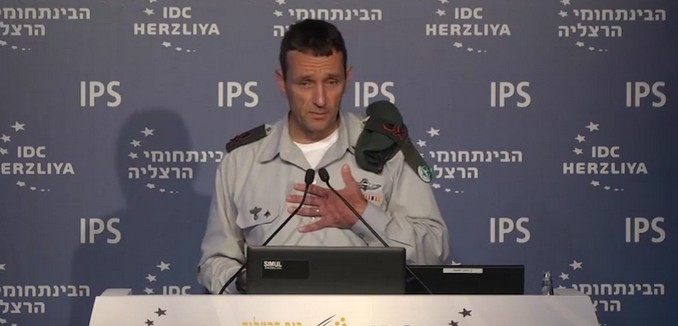Iran is a major state sponsor of terrorism that gives anti-Israel groups hundreds of millions of dollars each year, the intelligence chief of the Israel Defense Forces said during the IDC Herzliya Conference on Wednesday.
Maj. Gen. Herzi Halevi detailed how Iran contributes $50 million to Hamas’ annual budget, while bankrolling its Shi’ite Lebanese proxy Hezbollah with $75 million and funding Palestinian Islamic Jihad with an additional $70 million, The Jerusalem Post reported.
Halevi also noted that Tehran transfers weapons and missiles while providing training and technology to these groups. Iran is regularly “acting to get exact and advanced weapons into Lebanon and Yemen,” Halevi said. It is also building facilities to produce precision weapons and advanced rockets inside Lebanon, a development which Israel says it will not tolerate.
News of a secret Iranian missile factory in Lebanon was previously reported by a Kuwaiti newspaper in March.
Referring to recent Israeli airstrikes in Syria, Halevi stated that “Israel cannot ignore this development and we have not.” Most of Israel’s reported strikes have been around Damascus, about 60 kilometers from the Israeli Golan Heights, aiming at cutting the biggest supply artery to Hezbollah.
Halevi also referred to the situation inside the Gaza Strip, saying that “the dispute about electricity in Gaza is an internal Palestinian issue” between Hamas and the Palestinian Authority. He placed the blame for the humanitarian crisis and lack of construction supplies squarely on Hamas.
Israel has let into Gaza “four times the volume of building materials” required to build one of the world’s largest buildings, but “Hamas is using the materials for war, not rebuilding,” Halevi concluded.
Former Treasury Secretary Jack Lew said in 2015 that “Iran is expected to use new revenues chiefly … by shoring up its budget, building infrastructure, maintaining the stability of the rial, and attracting imports,” rather than funding terror. Similarly, former President Barack Obama said in a speech that August, “our best analysts expect the bulk of this revenue to go into spending that improves the economy and benefits the lives of the Iranian people.”
However, The Wall Street Journal reported in August 2016 that “Mr. Khamenei and his allies look to be the deal’s big winners.” This means that the new U.S. administration will have to decide whether “to continue to work with Iran or to challenge an increasingly entrenched supreme leader and his Revolutionary Guard,” the Journal noted.
[Photo: HerzliyaConference / YouTube ]




